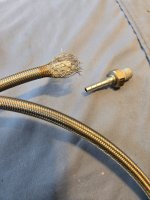I'd maybe only wear hearing protection until you're sure you've got the hang of things.
Most compressors are noisy. And if you burst a fill line it'll be louder than a typical gunshot.
I dunno what the inside diameter is on the microbore hose but I wouldnt want to get smacked with one. The 1/4" i.d. hoses at 10k psi whip around enough to break watermelons.
Upvote 0
